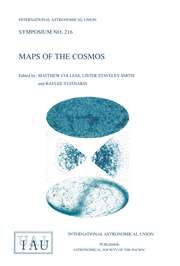No CrossRef data available.
Article contents
The dynamics of red supergiant winds
Published online by Cambridge University Press: 03 August 2017
Abstract
During the red supergiant (RSG) stage of massive star evolution, emission from dust and molecules allows the copious stellar winds to be studied in great detail. This help us understand not only the evolutionary stages of the star (which are highly dependent on mass loss rates), but also the morphology of the eventual supernova remnant. Maser emission from OH and H2O has been mapped with milli-arcsec resolution (using MERLIN and the EVN/global VLBI) around RSG including VY CMa, S Per and VX Sgr. The H2O masers originate in clouds accelerating away from the star and OH mainlines masers interleave the outer parts of the H2O maser shell. Zeeman splitting of OH maser lines reveals the orientation and strength of stellar-centred magnetic fields.
- Type
- Part 2. Stellar Masers
- Information
- Symposium - International Astronomical Union , Volume 206: Cosmic Masers: From Protostars to Blackholes , 2002 , pp. 306 - 309
- Copyright
- Copyright © Astronomical Society of the Pacific 2002


